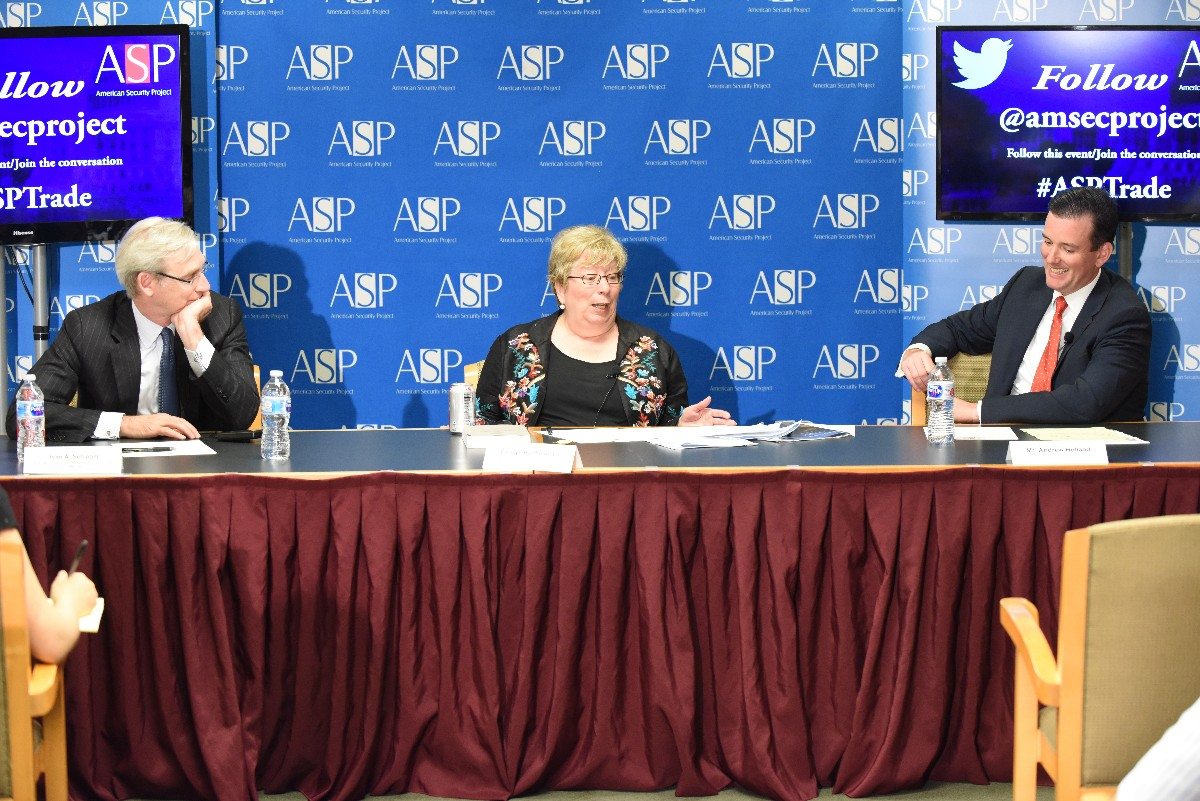 Photos via the American Security Project
Photos via the American Security Project
Event Recap: Perspectives on a Trade War – The Trade and Investment Disputes between the U.S. and China
Podcast: Play in new window | Download
Subscribe: Apple Podcasts | RSS
On May 15, the American Security Project hosted an event on the prospects of a trade war between the United States and China. The panel included Carolyn Bartholomew, Vice Chairman of the U.S. – China Economic and Security Review Commission, and Ivan Schlager, from Skadden, Arps, Slate, Meagher & Flom LLP and Affiliates and head of his firm’s CFIUS practice.
Ivan Schlager started off the panel discussing the Trade and Competitiveness Act of 1988, and how part of the act that was specifically drafted to address China and to create comprehensive trade policy. A key piece of this act, and one that Schlager helped draft, is the Exon-Florio Amendment. While this amendment has evolved over time, today it focuses on the competitive impacts related to China, which as Schlager said, “is operating under a different set of rules” than the rules-based trading system the United states is operating, due to their different economic systems.

Ivan Schlager, from Skadden, Arps, Slate, Meagher & Flom LLP and Affiliates
Carolyn Bartholomew highlighted the importance of adding the term “fair” as it necessary for “a free and open trading system.” Since 2002, when China joined the WTO, the trade deficit between the U.S. and China has grown to $4 trillion, indicating an imbalance in the relationship, underscoring the necessity for “fair” to be included.
She went on to outline that China has been ahead of the United States in seeing national security and economic security as intertwined. Schlager agreed, stating that many of the commercial innovations we see today were developed as part of U.S. military programs. However, Bartholomew argued that China is utilizing civilian technology for military purposes, which is something the U.S. needs to keep in mind, especially when purchasing seemingly benign Chinese products or services.

Carolyn Bartholomew, Vice Chairman of the U.S. – China Economic and Security Review Commission
ASP’s Andrew Holland then shifted the conversation to ask, “why now?” with regards to tariffs and CFIUS reform. Schlager and Bartholomew agreed that it has been building up for many years and finally came to a head in the 2016 election, due to the effects of unfair trade practices on the traditional labor force in certain states. Bartholomew went on to highlight that the debate about the U.S.-China relationship has shifted over the last decade, when the business community began to see that the returns they expected from the relationship were not being actualized.
Holland then opened the discussion to questions from the audience. The first question centered around the theft of intellectual property, a key issue businesses experience with China. Schlager stated that China has a different perspective on intellectual property, which affects businesses that would like to enter the Chinese market. Bartholomew highlighted the fact that it was a belief in the 1990s and 2000s that China would prevent the theft of intellectual property when they have more patents to protect, but that has not yet been seen.
The next question focused on how China does not necessarily need to trade with the United States, as it can turn to Taiwan, Japan, and South Korea for labor and goods – a critical point of the trade relationship between the U.S. and China. Both Schlager and Bartholomew agreed that this was a key point as increased cooperation is necessary between the United States and its allies to create lasting legislation and an enduring comprehensive trade policy regarding China.
A key takeaway from the panel is that China is both an economic and strategic competitor to the United States. The U.S. needs a comprehensive trade strategy that has structures in place to welcome and enable investment with China and create a baseline of trust with the Chinese government, while protecting American companies.





